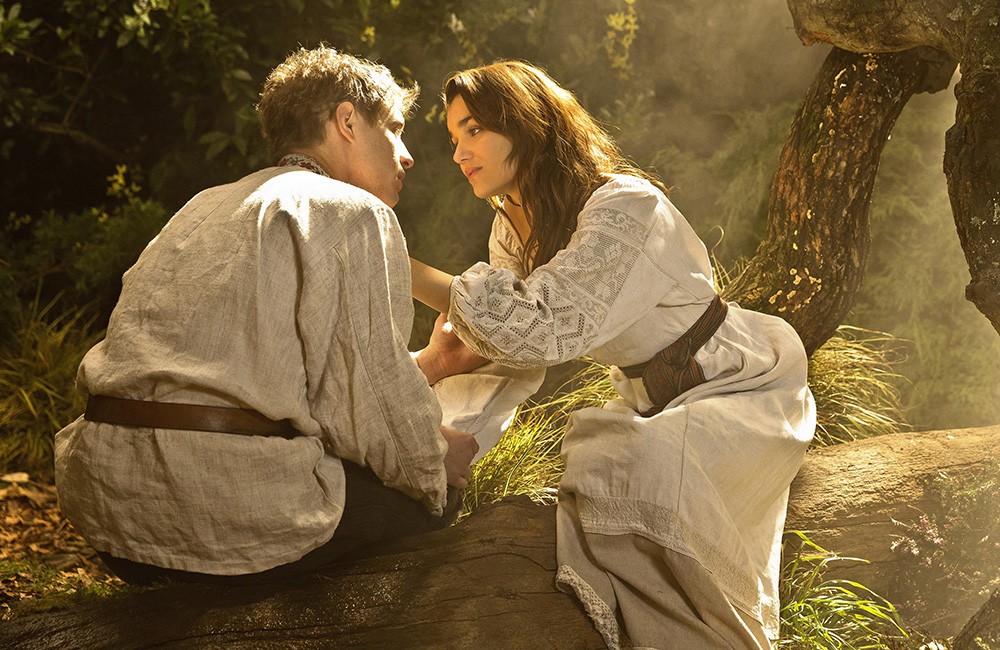Bitter Harvest
Bitter Harvest, 2017, 1 ¼ stars
Fruitless Harvest
Historical drama unworthy of its subject
From The Orlando Weekly, February 22, 2017
The Ukrainian Holodomor, or “death by hunger,” was one of history’s most horrible genocides, rivaling the Holocaust in numbers. Yet you’ll gain more appreciation of it by reading a few paragraphs of the Wikipedia article than by watching Bitter Harvest.
The romantic drama attempts to relay the struggles of Ukrainians during Stalin’s brutal enforcement of agricultural collectivization. As their storytelling vehicles, director George Mendeluk and writer Richard Bachynsky Hoover have chosen two fictional characters: young peasants Yuri (Max Irons) and Natalka (Samantha Barks).
“My Ukraine was a world where legends lived and anything was possible,” Yuri, an aspiring painter, tells us in voiceover. But as oppression sets in, it’s not the endless possibilities that occupy their minds – it’s survival. At least they have their love, which is unwavering from childhood, through marriage, through Yuri’s journey to Kiev to find work.
It sounds like a noble, necessary tale, and it is in theory, but the ambitious production went wrong somewhere. It started with a script from Hoover, a Canadian Ukrainian who passionately championed it for years. Fellow Ukrainian Ian Ihnatowycz ultimately agreed to produce and fully finance the film, which shot extensively in Kiev. Though the staid screenplay is filled with pat lines like “no one can ever take away your freedom,” the blame seems to fall more on Mendeluk, whose 72 directorial credits on IMDB read more like a recipe for B-level entertainment than a requisite for a period epic.
Editors Stuart Baird and Lenka Svab should also be faulted, as the story is somehow whittled down to just one hour and 43 minutes, forcing scenes to flow confusingly into one another, lacking clarity and emotion. Not lacking are stiff performances, overbearing music and unpredictable dialects ranging from Russian to a mix of British sounds that include modern Estuary and Cockney. These flaws turn people into caricatures and cloud our comprehension of character motivations and the tragedy itself. They also muddy the film’s timeline, as the Holodomor seems to begin with the death of Lenin in 1924 but actually happened in 1932-33, a fact we learn only at the film’s end.
Irons (Red Riding Hood, The Host and, yes, son of Jeremy) and Barks (Eponine from Les Miserables) are competent – and young Jack Hollington is superb as an orphan – but they get little help from the supporting cast. Playing Yuri’s grandfather is veteran Terence Stamp, who is almost entirely wasted, as is Barry Pepper as Yuri’s father. Also unimpressive are Tamer Hassan as a cardboard cutout of a Russian villain and Aneurin Barnard as Yuri’s best friend and leader of the pro-Ukrainian political movement. The latter’s love for Natalka would have made an interesting sub-plot but, thanks to poor writing or editing, is barely noticeable. The same is true for other potentially intriguing elements, such as Yuri being forced to subvert his artistic creativity to create propaganda paintings.
The worst scenes feature Stalin. Played without a hint of believability by Gary Oliver, he reminds one of Seinfeld’s Saddam Hussein, who double parks and blocks in Kramer’s car in The Dinner Party episode. (Oliver’s “Damn those Ukrainians!” is the film’s comedic highlight.)
Bitter Harvest does offer pretty cinematography and respectable battle scenes, and it gains credibility with its book-end finale, but the victims of the Holodomor deserve an infinitely better cinematic epitaph.
© 2017 Orlando Weekly / MeierMovies, LLC
